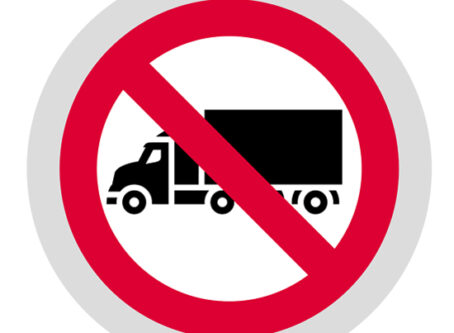Washington state bills covering truck parking, rest areas, restrooms advance
A Washington Senate panel today is scheduled to discuss a bill to address a national safety concern for truck drivers and the motoring public. An official with the Owner-Operator Independent Drivers Association is expected to testify.
Sponsored by Rep. Dan Griffey, R-Allyn, HB1655 would direct the Washington State Department of Transportation to keep state-owned and operated rest areas open. Exceptions would be made for seasonal closures, cleaning, maintenance, and repairs.
Griffey describes the lack of safe overnight truck parking as being a “crisis.” In previous discussion with legislators, he said the state DOT needs to work to maintain rest areas, which he describes as a “vital part” of the network.
House lawmakers voted unanimously last week to advance Griffey’s bill to the Senate. The Senate Transportation Committee is scheduled to hold a hearing on HB1655 on Thursday afternoon.
The Washington Trucking Associations, OOIDA, and the American Trucking Associations support the legislation.
The truck groups say the bill should be a model for state legislatures around the country to consider.
Truckers feel unsupported
Griffey took up pursuit of the rule following fall closures of many state-owned and operated rest areas in the state.
WSDOT owns and operates 47 rest areas across the state. In January, eight rest areas were closed due to staffing issues, maintenance and winter conditions.
“The closure of state-owned safety rest areas is contrary to state policy to have zero deaths on the roadways,” Griffey wrote in the bill.
He added that to help prevent serious and fatal injuries, HB1655 would encourage the opening of safety rest areas for all drivers who need a place to stop when they are tired.
Griffey said availability to rest in designated areas is of the utmost importance during the global supply chain shortages.
Speaking at a recent House Transportation Committee, Rep. Davina Duerr, D-Bothell, said that truck drivers are having a tough time finding parking in Washington and throughout the nation.
“Truckers are feeling unsupported and many don’t feel their job is worth it,” Duerr said. “A lack of safe and accessible parking for truckers to rest is a big problem in Washington and across the country. Truckers are essential members of our community and help keep our economy moving by transporting goods, foods, and other needs to market and our homes.
“(HB1655) is about recognizing their dignity and their right to safety. It’s also about keeping our roadways safe.”
Griffey adds that truck drivers are mandated by law to park and rest.
“Quite frankly, they are finding it nearly impossible to find places to catch up on their rest cycles.”
The introduced version of the bill permitted the state DOT to issue short-term contracts to provide cleaning, security, or repairs to the rest areas when the department is unable to provide such services using existing employees.
The language was amended to allow WSDOT to initiate a process that addresses the maintenance, operation, and safety of its owned and operated safety rest areas.
OOIDA and WTA make voices heard
OOIDA Executive Vice President Lewie Pugh recently provided testimony on the bill. He told lawmakers that truck parking is in a national crisis.
“All across this country truckers every night are wasting hours trying to find a safe place to park and get their rest,” Pugh said. “We know there are lots of places, lots of communities, that don’t want trucks. They don’t like trucks, but truckers are a vital asset, along with the parking.”
Sheri Call, WTA president and CEO, said her group has “studied the issue exhaustively and there is no disagreement there is a truck parking shortage in Washington.”
On Thursday, the truck groups will once again be before lawmakers to convey their concerns about truck parking.
Pugh is expected to bring attention to committee members the failure of the federal government to address the issue.
“The United States Congress failed truck drivers by not including dedicated funding for truck parking in the in the infrastructure bill that was signed into law last year,” Pugh’s testimony reads. “This means that preserving existing truck parking capacity is critical, and that includes keeping rest areas open as much as possible.
“As someone who was out on the road for 23 years, I know firsthand how much drivers use rest areas to get needed rest, stretch their legs, comply with the federal hours-of-service requirements, check their load securement, inspect their equipment, and make roadside repairs. These are just a few of the reasons rest areas should be open.”
Independent truck driver and OOIDA Board member Tilden Curl of Olympia, Wash., has submitted written testimony to the committee.
He tells lawmakers that the lack of truck parking results in increased costs for every business and consumer located in the affected areas.
“Commercial truck parking is critical for efficient trucking operations and compliance with federal hours-of-service requirements,” Curl wrote. “Truck drivers depend on these rest areas for personal needs, compliance, safety checks on loads and equipment, as well as a place to rest. These safety rest areas are paramount for truckers and the motoring public.”
Pugh thanks the Washington Legislature for their pursuit. He says lawmakers in the state are doing more than the federal government and any other state to address the truck parking issue, and access to restrooms.
Addressing big problem
One of the Washington state bill’s Pugh is referring to is intended to reduce emissions and safety risks of inadequate commercial truck parking in the state.
Griffey is also the sponsor of the bill to address the “big problem” of a lack of safe and secure overnight truck parking.
“We are finding that we are not treating our truckers very well and dealing with the global supply chain shortage. Washington state’s policies are kind of getting in the way,” Griffey previously testified.
“What we are asking for in this bill … is that we give the private sector and a little bit of the public sector the ability to creatively figure out this problem so that we do not spend any of our hard-earned dollars. What the bill does is it gives a tax preference to those people that invest in overnight parking.”
Tax benefits
An analysis attached to the bill, HB1657, shows the average cost to construct a single parking station to range from $800,000 to $1.4 million.
Griffey’s bill would add capacity through tax reductions associated with expanding existing parking and developing new parking.
Specifically, all real and personal property would be exempt from property taxes at a time when there are a minimum of 10 “safe, overnight commercial truck parking spaces constructed.”
At the urging of OOIDA and the state trucking associations, HB1657 calls for truck parking spaces to be set at minimum dimensions of 70 feet long and 12 feet wide.
On Feb. 4, the House Finance Committee voted 16-1 to advance the bill.
Less capacity, more truckers
Pugh told the committee that OOIDA members identify parking as one of the problems they face daily. He added that members say they spend at least an hour each day trying to find a safe place to park.
“What we’ve been doing in the past just isn’t working. Every year there is less capacity, but there are more trucks on the road,” Pugh said. “(HB1657) is a way to allow private companies to figure out ways to add parking, and to get a tax incentive.”
Call added that the issue of truck parking presents a simple problem for which there are few simple answers.
“There have been several potential solutions but none better or more preferred by truck drivers than parking in areas where services are provided, such as truck stops. HB1657 provides incentives for private development of truck parking spaces and presents a challenge to add new capacity where drivers prefer to park.”
Restroom access
The third bill backed by truck groups would give truck drivers operating at ports around the state assurances for access to restroom facilities.
The Senate Transportation Committee is scheduled to discuss the bill, HB1706, Thursday afternoon.
House lawmakers voted unanimously on Feb. 13 to advance the bill to require terminal operators to provide “a sufficient number of restrooms” for use by drayage truckers in areas of the terminal that operators typically have access. Areas covered in the legislation from Rep. Mike Sells, D-Everett, include inside the gate and truck queuing lots.
Restrooms could include fixed bathrooms or portable toilets.
Terminal operators would be in compliance with the rule when a policy is in place to allow drayage truckers to leave their vehicles at “reasonable times and locations” for purposes of access restrooms.
Facilities must be located in areas where access would not pose an “obvious health or safety risk” to the user.
Drayage truck operators accessing the terminal for the purpose of loading, unloading or transporting cargo would be covered by the rule.
A section of the bill covering restroom access for truckers at retail establishments during normal business hours was removed in committee.
The committee was told the retail establishment provision is already covered in other areas or statute.
OOIDA has concerns about removing the provision from HB1706.
“If there’s an existing requirement that requires retailers and ports to let truck drivers use their restrooms, it is failing miserably,” OOIDA Director of State Legislative Affairs Mike Matousek previously told Land Line Media. LL
More Land Line coverage of news from Washington.









